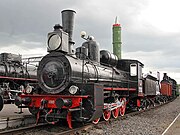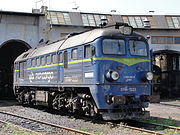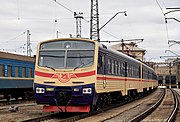Luhanskteplovoz
| Company type | Open joint stock company |
|---|---|
| Industry | Rail vehicle manufacturing |
| Founded | 1896[1] |
| Founder | Gustav Hartmann[2] |
| Defunct | 2015 |
| Fate | looted[3] in 2015 during the war in Donbas production stopped in 2015 (Ukrainian sources) or 2016 (Russian sources)[3][4] |
| Headquarters | , |
Key people | Director: Bykadorov Viktor Deputy chairman of the Board : Gennady G. Basov Chief Designer: Konstantin Pavlovich Mishchenko Chief Technologist : Eugene A. Yakimenko[5][6] |
| Products | Locomotives |
| Owner | Transmashholding[4] |
Number of employees | >7000 (2009)[7] |
| Website | www.luganskteplovoz.com |
Luhanskteplovoz (Ukrainian: Луганськтепловоз or Luhansk Locomotive Works), earlier known as Voroshilovgrad Locomotive Works is a large industrial company in Luhansk, Ukraine, manufacturing locomotives, multiple unit trains (both electric and diesel) as well as other heavy equipment. Due to the war in Donbas it has not been operating since March 2015.[3] According to media reports, by late 2015 the works were looted and completely inoperational.[3]
The company was founded in 1896 as Russische Maschinenbaugesellschaft Hartmann in Lugansk (Russian Engineering Company Hartmann in Luhansk) and renamed October Revolution Locomotive Factory in November 1922.[1]
In the second half of the twentieth century the plant produced thousands of the well known 'M62 locomotive' and DR Class 130 (TE109) ("ludmillas") diesel electric locomotives for eastern European Soviet Bloc countries.
History
[edit]1896 to 1995
[edit]
The plant was founded in 1896 by Gustav Hartmann,[note 1] the first locomotive being produced in 1900; by 1906 the factory's output was comparable to the two major locomotive production centres in Russia at that time : the Bryansk works and the Putilov works. Between 1928 and 1933 the works was expanded and production of the powerful 2-10-2 locomotives of the FD class (ФД)[note 2] and 2-8-4 configuration IS class (ИС)[note 3] began.[2]
During the second world war work switched to military production, the plant being evacuated twice in the course of the war. By 1945 locomotive production has resumed with SO class (CO)[note 4][2]

In 1956 steam locomotive production ceased; over 12,000 steam locomotives having been produced, and the plant was converted to the production of locomotives powered by diesel engines by 1957[1][2]

Initially diesel machines using hydraulic transmissions TG100, TG102, TG105, TG106 (ТГ100, ТГ102, ТГ105, ТГ106)[note 5] were produced, though eventually electrical (DC) transmissions became the norm on Russian railways, such as mainline locomotive type 2TE10L (2ТЭ10Л)[note 6] and its variants, which started production at Luhansk in 1962, eventually more than 12,000 units had been produced.[2] In 1965 the first M62 locomotive was produced at the plant.
In 1967 the TE109 (ТЭ109) locomotive was created; using an AC/DC electrical transmission,[note 7] which formed the basis for a successful series of locomotives, better known in western Europe by the standard gauge (1435mm) version : DR Class 130 and variants. Later products included the high powered TE121 (2ТЭ121) and variants introduced 1977, and working experiments in AC traction TE120 and 2TE127 (ТЭ120 and 2ТЭ127), and liquified gas powered locos 2TE10G and 2TE116G[note 8] (2ТЭ10Г and 2ТЭ116Г)[2] - the latter based on the 2TE116 diesel.
In the late 1970s the plant was expanded and a record of over 100 locomotive units produced per month was achieved in the 1980s. Later in the 1990s mining machinery and urban transit rolling stock became part of the factories portfolio. With the breakup of the Soviet union the plant became the property of the Ukrainian state and in 1995 the state holding company Luhanskteplovoz was created.[2]
1990s
[edit]
Since 1997 the plants has started production of diesel multiple units such as DEL-01 (ДЕЛ-01), DEL-02 (ДЭЛ-02), push-pull trainsets DPL1 (ДПЛ1) and DPL2 (ДПЛ1) for diesel locomotives, electric multiple units EPL2T (ЕПЛ2Т) and EPL9T (ЕПЛ9Т) as well as passenger diesel locomotive TE114I (ТЕ114І) (designed for desert conditions).[8]
In the 90s, the factory started producing trams. None of its models were widely successful, with 4 LT-5 built for Moscow and none in service, around 20 LT-10 trams in various cities.[9] The unused serial numbers likely represent incomplete bodies. However, the plant is notable for building the first low-floor tram car in Ukraine, the LT-10A.[10]
2009 privatisation
[edit]

After becoming part of state owned property following Ukrainian independence the process of privatising the company put under consideration in 2005,[12] in 2006 potential shareholders were OJSC Demikhovsky Machine-Building Plant, DniproVagonMash, OJSC Marganets Ore Mining and Processing Enterprise, CJSC Management company Bryansk Machine-Building Plant.[13] Of the bidders only two: Bryansk Machine-Building Plant and Demikhovo Machinebuilding Plant were selected as suitable; both being part of the Transmashholding group of companies.[14] The successful buyer was Bryansk machine building plant, offering ₴292.5 million ($58 million[15]) for a 76% stake; this was only 0.5 million more than the bidding auction starting price.[14] Analysts at the time valued the asset at $200 million.[15]
The then president Viktor Yushchenko believed that the Ukrainian people had been defrauded, with the business being sold for a fraction of its true worth.[16] The then prime minister Yulia Tymoshenko also called for a review of the privatisation of Luhanskteplovoz[17] along with two other enterprises Dniproenergo and Nikopol Ferroalloy Plant[18] and BYuT MPs petitioned the Prosecutor General's Office for criminal proceedings to take place concerning alleged criminal activity by the heads of the State Property Fund.[19]
The sale was ruled illegal in 2008.[20] From uncertainty over the eventual status of Luhansteplovoz is said to have prevented the then owners Transmashholding from making further investments in the plant.[21] Since the ruling the decision has been challenged by the State Property fund.[22]
It was expected that the company would be attempted to be re-privatised included in the 2008 privatisation scheme,[22] but instead the auction process started March 2010.[15] Again analysts stated the starting price set by the Ukrainian government was once again surprisingly low at $50 million; while the company's stock market value was estimated at $127 million.[15]
End of works
[edit]After the outbreak of the Russo-Ukrainian War and the capture of Luhansk by the Luhansk People's Republic, Luhanskteplovoz was re-registered in the city of Sievierodonetsk.[3]
Due to the war in Donbas it became difficult to deliver components from Germany and the United States to the Luhansk plant by February 2015.[3] Hence in March 2015 the plant stopped working.[3] According to media reports, by late 2015 it was looted and completely inoperational.[3] According to the Luhansk People's Republic representatives the looters had used fake contracts to carry out the illegal dismantling and removal of plant equipment.[3] According to the Russian REGNUM News Agency Luhanskteplovoz owners, the Russian company Transmashholding, stopped production in 2016.[4] Although it had overcome delivery problems because Luhanskteplovoz had become "completely unified with a similar plant in Bryansk".[4] REGNUM claims production was halted in 2016 because Transmashholding was afraid international sanctions (in place since 2014 in response to the escalating War in Donbas) could jeopardize its cooperation with Siemens.[4]
Gallery
[edit]-
Class O
-
Class L
-
TE114 in Syria
-
M62 locomotive, the company's most common model
-
2TE10M/3TE10M
-
Former DR 130 (TE109) locomotive in the Netherlands
-
TEM2
-
EPL2T electric multiple unit built since the 2000s.
See also
[edit]References and notes
[edit]Notes
[edit]- ^ Son of Richard Hartmann; also an industrialist
- ^ Named after Felix Dzerzhinsky (Феликс Дзержинский)
- ^ Named after Joseph Stalin (Iosif Stalin)
- ^ Named after Grigol (Sergo) Orjonikidze (Серго Орджоникидзе)
- ^ Cyrillic TГ : "T" indicates Тепловоз "Diesel-locomotive", "Г" гидропередачей - "hydraulic transmission"
- ^ Cyrillic TЭ : "T" indicates Тепловоз "Diesel-locomotive" , "E" Электричество - "electricity"
- ^ Electricity produced as alternating current (AC) by an alternator, and then rectified to direct current (DC) to supply DC motors
- ^ The prefix "2" indicates two units permanently coupled, G (Г) indicates 'gas' (Газ)
References and sources
[edit]- ^ a b c Maurice Railroad Equipment Industry List (MREIL) List of European locomotive and rolling stock manufacturers collated by Maurice Jansen, via railfaneurope.net
- ^ a b c d e f g Company History Archived 2009-01-24 at the Wayback Machine luganskteplovoz.com
- ^ a b c d e f g h i "The Luhanskteplovoz plant has been almost completely looted: the equipment is being scrapped. PHOTO". Censor.Net (in Ukrainian). Retrieved 3 December 2015.
- ^ a b c d e "The LDNR industry is alive, but the prospects are bleak" (in Russian). REGNUM News Agency. Retrieved 8 April 2019.
- ^ The leadership of the Company Archived 2009-01-23 at the Wayback Machine luganskteplovoz.com
- ^ Technical services Archived 2009-05-25 at the Wayback Machine luganskteplovoz.com
- ^ Composition of the company Archived 2009-05-25 at the Wayback Machine luganskteplovoz.com
- ^ About JSC Luhanskteplovoz Archived 2009-05-25 at the Wayback Machine luganskteplovoz.com
- ^ "LT-10 — Roster". transphoto.org. Retrieved 2021-05-20.
- ^ "LT-10A". transphoto.org. Retrieved 2021-05-20.
- ^ Luhansk locomotives appear on new postage stamps in Ukraine ukrinform.ua
- ^ Government to shortly consider LuhanskTeploVoz holding company's likely privatization Archived 2009-11-03 at the Wayback Machine 29-12-2005 nrcu.gov.ua
- ^ State Property Fund names potential buyers of LuhanskTeplovoz share holding 28.09.2006, State Property Fund of Ukraine, via Web-portal of the Ukrainian Government. kmu.gov.ua
- ^ a b Page 2 "Privatisation" Archived 2008-05-12 at the Wayback Machine INSTITUTE FOR ECONOMIC RESEARCH AND POLICY CONSULTING MONTHLY MONITOR, Monthly Economic Monitor Ukraine, No.4 2007 uainsur.com
- ^ a b c d Big plant on sale block for small price, Kyiv Post (April 2, 2010)
- ^ Excerpt from April 12 press conference, Responsibility. Lawfulness. People's Choice Archived 2008-10-14 at the Wayback Machine section: PRIVATIZATION ISSUES, 12/4/2007, Press office of President Victor Yushchenko, president.gov.ua
- ^ Yushchenko orders to check privatization of Luhanskteplovoz ukrainianjournal.com
- ^ bne businessneweurope Archived 2011-07-20 at the Wayback Machine January 21, 2008, page 7 www.businessneweurope.eu
- ^ MPs from BYuT addressed Prosecutor General's Office with request to launch criminal proceedings into illegal privatization of OJSC Luhanskteplovoz Archived 2009-11-03 at the Wayback Machine 18-01-2008 nrcu.gov.ua
- ^ SUPREME COURT RULES AGAINST PRIVATIZATION OF "LUHANSKTEPLOVOZ" ukrinform.ua
- ^ Luhanskteplovoz cuts jobs Archived 2011-10-09 at the Wayback Machine 13/4/2009 ufc-capital.com
- ^ a b National News Service of Ukraine, Query: LUHANSKTEPLOVOZ ukrinform.ua
External links
[edit]- Official site luganskteplovoz.com
- Delisted 2019 Ukrainian Exchange
- Power structure Luhanskteplovoz










